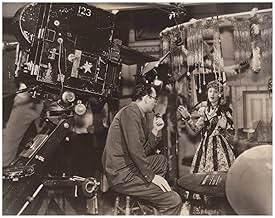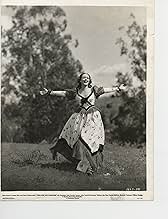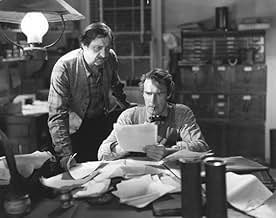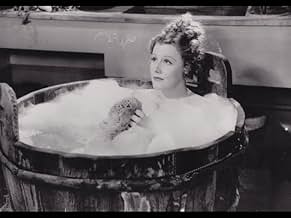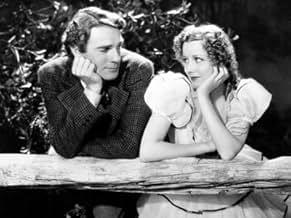Pennsylvania, 1859. Railroad tycoon Brennan (Alan Hale) is muscling in on oil-drilling farmers, led by Peter Cortland (Randolph Scott). Cortland must try to save their oil business, while al... Read allPennsylvania, 1859. Railroad tycoon Brennan (Alan Hale) is muscling in on oil-drilling farmers, led by Peter Cortland (Randolph Scott). Cortland must try to save their oil business, while also saving his marriage to Sally (Irene Dunne).Pennsylvania, 1859. Railroad tycoon Brennan (Alan Hale) is muscling in on oil-drilling farmers, led by Peter Cortland (Randolph Scott). Cortland must try to save their oil business, while also saving his marriage to Sally (Irene Dunne).
- Director
- Writers
- Stars
- Student
- (uncredited)
- Director
- Writers
- All cast & crew
- Production, box office & more at IMDbPro
Featured reviews
Paramount obviously had high hopes for this movie, assigning Rouben Mamoulian to direct and cinematographers Vic Milner and Theodore Sparkuhl to supervise the cameras. The cast is likewise excellent: Dorothy Lamour, Raymond Walburn, William Frawley, Charles Bickford, and Akim Tamiroff are just two of the actors adding their talents to the spectacle.
Unhappily, the score is not among the best of the Hammerstein-Kern efforts. Other reviewers have expressed their admiration for Miss Dunne's rendition of the sentimental "The Folks Who Live on the Hill." I prefer Frawley's "Will You Marry Me Tomorrow, Maria?", but there isn't much to it, and and old-fashioned orchestration -- suitable for the 1860 setting -- makes the songs unmemorable.
What's left is the "little guys against greedy capitalists", and there are some beautifully shot sequences, especially when the circus (complete with elephants) comes to the rescue of the men building the pipeline. Yet while the camerawork makes the movie always engaging, the tired story and bad score limit it to that.
The rest of the movie is really good, so I'm glad I gave it another chance! No one knows exactly why Randolph Scott left traditional Hollywood and did westerns with his own production company, but when you see him in the 1930s, you'll see him giving his heart to different performances. Although his westerns were very popular, my heart aches that he wasn't given the A-tier Hollywood movies. He could have easily stepped into Shane, High Noon, or any John Wayne flick. He had the talent, the looks, and the onscreen energy to take Hollywood by storm. But I've never seen him exercise his acting chops more than in this movie. In one passionate speech, he's actually moved to tears in order to inspire the workmen to finish the job. He's romantic, determined, and ambitious, convinced that there's oil in the hills. No matter what anyone says, he continues to drill - and one day, it all pays off. But Irene loves him for the country bumpkin he used to be; will everything change when they're rich?
This movie didn't need to be a musical, especially since Irene Dunne only sings a few songs that don't really matter to the storyline. Scottie McScottie Pants never sings, but he does get to gaze adoringly at her as she serenades him. They have such fantastic chemistry together in this movie (and a steamy bedroom kissing scene) it makes you wonder if the sparks flew off the screen, too. With the love shining from his eyes, his blonde curls, and his strong muscles as he drills for oil, you almost forget anyone else is in the movie. But there is Irene Dunne, who loves him above all else, and you'll also see Dorothy Lamour briefly, and a young, brown-haired Charles Bickford!
Irene Dunne stars as a singer/dancer who travels the country as part of pop Raymond Walburn's medicine show. When the medicine show wagon burns up during a stint in Pennslyvania, Dunne, Walburn, and faux Indian entertainer William Frawley are stranded and put up for the night by farmer Randolph Scott and his grandmother Elizabeth Patterson. The trio works their way into Scott and Patterson's heart and stay on as help to earn their keep until Walburn can rebuild an old wagon Scott has given him. Irene and Randolph fall in love and she encourages him with his dream as he drills for oil on the family homestead. When the wagon is built and it's now time to go, the sheepish Scott can't bring himself to propose to Irene but as the wagon leaves and encouraged by grandma, Scott rides off to meet them and fetch Irene back.
At their wedding, the oil well hits a gusher and Scott and the local farmers are ecstatic about their potential fortunes. Alas, evil railroad magnate Alan Hale is out to milk them of every penny of profit by excessive fees to ship the oil on his railroad, hoping to make them sellout to him. Scott gets a brainstorm to build a pipeline to move the oil which Hale repeatedly attempts to thwart with his gang. Meanwhile, the Scott-Dunne union is crumbling due to his excessive devotion to the oil wells and when Irene is seen by Randolph singing in a saloon along with her poor friend Dorothy Lamour, a former shanty boat singer whom Irene is trying to help land a job, they have a big fight and Irene leaves to join her father in his current position with a traveling circus. Meanwhile, Hale continues his dastardly plans to ruin Scott's pipe dreams.
Irene Dunne is excellent as Sally, the rather elegant medicine show entertainer and Randolph Scott more than holds his own in a superb performance as her dashing bucolic white knight. Irene has several beautiful numbers including the classic "The Folks Who Live on the Hill". Dorothy Lamour is also excellent as the saloon singer who at one point is run out of town by the prudish "good people" of the area and sings the very lovely "The Things I Want". Elizabeth Patterson is always an asset to a movie and has one of her larger film roles here as the tough but loving grandmother and terrific comic support is supplied by William Frawley (who has also has a good song number at the wedding) and Ben Blue.
HIGH WIDE AND HANDSOME appears to have been only a modest success at the box office and is one of the least seen Irene Dunne films, as of early 2011 I don't believe it's ever aired on a cable network nor has it ever been released on video or DVD. While not a classic and not without it's flaws (the oil saga with good guys fighting powerful villains has perhaps been done in too many old films and the surprise heroes of the final reel give a rather absurd touch to the climax) it deserves to be seen and it's excellent songs and performances and beautiful set design and cinematography make it a quite memorable movie musical.
The story begins with Sally Watterson (Irene Dunne), a young girl traveling with her medicine sideshow father named "Doc" (Raymond Walburn), singing the title song as they settle in a western Pennsylvania town. As "Doc" tries selling some medicine bottles to his patrons, which proves to be a fraud by spectator Peter Cortlandt (Randolph Scott), a fight ensues amongst the crowd, damaging their wagon. Being given the hospitality of her home by Peter's grandmother (Elizabeth Patterson), the stranded Sally earns her keep by helping with the farm animals, and soon gets to know and love Peter, a rugged oil prospector, whom she eventually marries. Their marriage, at first, is a happy union, until Peter neglects his wife in favor of keeping his promise with the neighboring farmers by banding together in laying oil pipelines in order to prevent Red Scanlon (Charles Bickford), a corrupt railroad president, from monopolizing the industry. After Sally is found entertaining on top of the table in the barroom with Molly (Dorothy Lamour), a saloon girl she and Peter had earlier rescued from a lynch mob, the couple find themselves in an argument which sends Sally to leave her husband and return to life entertaining in the passing circus show and to her father, while Peter tries to fulfill his pipeline dream, which, at the present time, proves to be more important than trying to find Sally and resolve matters. The elaborate and well staged sequence with thousands of prospectors racing against time to get the gigantic oil pipeline finished on schedule is almost similar to King Vidor's conclusion of OUR DAILY BREAD (1934) where the farmhands are seen rushing to ditch a waterway in order to save their dying crops, but with this production, an added bonus of rugged fighting scenes and one near miss scene adding to the suspense in which the unconscious Scott is nearly crushed by a falling pipe that lands inches from his head. Whew!
Almost forgotten today and rarely seen in recent years, HIGH, WIDE AND HANDSOME has its share of good tunes, with music and lyrics by Oscar Hammerstein II and Jerome Kern, including: "High, Wide and Handsome," "The Simple Maiden," "Can I Forget You?" (all sung by Irene Dunne); "Will You Marry Me Tomorrow, Maria?" (sung by William Frawley); "The Folks Who Live on the Hill" (sung by Irene Dunne); "The Things I Want" (sung by Dorothy Lamour); "Allegheny Al" (sung by Dunne and Lamour) and "Can I Forget You?" (reprise by Dunne). Of the songs, "The Folks Who Live on the Hill," sung by Irene Dunne wearing her old-fashioned wedding gown, comes off best and memorably, as she sings it to her new husband, Peter (Scott) after showing her the dwelling they are to live. Another memorable moment is seeing William Frawley (years before his "I Love Lucy" TV series days in the 1950s) in full voice singing "Will You Marry Me Tomorrow" during a ceremony. While Irene Dunne is no Jeanette MacDonald or Grace Moore when it comes to vocalizing, many forget how well she singing delivery is, and she does it quite well, but unfortunately, on the whole, the songs did not become as immortal as the other Hammerstein and Kern scores.
In the supporting cast are Alan Hale as Walt Brennan, the head of the transportation syndicate; Akim Tamiroff as the foreign gambler, Joe Varese; Irving Pichel as Mr. Stark; Lucien Littlefield, Purnell B. Pratt, and some light "comedy relief" supplied by Ben Blue playing Zeke, a hired hand. Raymond Walburn, a fine character actor appearing here as Irene Dunne's father, performs his task well, almost as if this role were intended with W.C. Fields in mind, especially with similarities in his medicine show man who tries to defraud his public with phony medicine bottles, etc.
Running ten minutes short of two hours, HIGH, WIDE AND HANDSOME is entertaining, quite original for its time, but sadly, a neglected item. A lot of effort went into this nostalgic production, and it shows. The only thing missing, and a real oversight, is Technicolor. Around this time, Paramount produced some fine Technicolor outdoors films, notably THE TRAIL OF THE LONESOME PINE (1936) with Sylvia Sidney, and EBB TIDE (1937) with Frances Farmer. How cinematic this handsome film would have looked in color. But overlooking this minor flaw, it's a movie worth seeing through once, and after its THE END title and list of actors and their roles (and underscoring to "The Folks Who Live on the Hill") before the final fadeout, it may make one wonder why this is among the rarely-seen western-type musicals gems (even with Turner Classic Movies showing August 16, 2019) from the "golden age of Hollywood" period. (***1/2)
Did you know
- TriviaAccording to Margaret J. Bailey's book on Hollywood costume design of the 1930's, "Those Glorious Glamour Years," apple trees in blossom were required for some scenes. Frost in California had decimated the apple trees, so studio technicians at Paramount Studios worked overnight, peeling rosebuds down and sticking them on bare trees with maple syrup to simulate an apple orchard in full blossom.
- Quotes
Mac: I'll bet Sally will be glad to get away from here.
Doc Watterson: You think so, Mac?
Mac: Sure. She's always fightin' with that Cortlandt fella. She hates the sight of him.
Doc Watterson: You know human nature, don't you Mac?
Mac: From A to Z.
Doc Watterson: You must have skipped W. The women come under W.
- How long is High, Wide and Handsome?Powered by Alexa
Details
- Release date
- Country of origin
- Language
- Also known as
- Jerome Kern and Oscar Hammerstein's High, Wide and Handsome
- Filming locations
- Production company
- See more company credits at IMDbPro
Box office
- Budget
- $1,900,000 (estimated)
- Runtime
- 1h 50m(110 min)
- Color
- Aspect ratio
- 1.37 : 1

